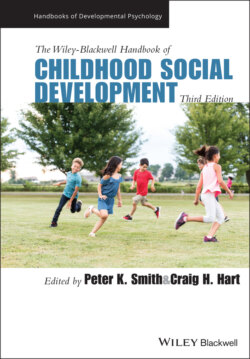Читать книгу The Wiley-Blackwell Handbook of Childhood Social Development - Группа авторов - Страница 32
Disruptions, deviations, and dysfunctions in the family system
ОглавлениеThe principal aspects of the family system that were investigated as detriments to children’s development were child abuse, marital discord and divorce, parental depression, and insecure parent–child attachment. Evidence of child maltreatment within families (e.g., abuse, neglect, child death; Sedlak et al., 2010) spurred research on the consequences of child abuse. Findings supported the conclusion that maltreatment impairs children’s health and well‐being during childhood and thereafter (Cicchetti & Toth, 2006). For example, it was discovered that sexually abused children often developed inappropriate sexual behavior, internalizing disorders, and interpersonal difficulties (Sawyerr & Bagley, 2017; Trickett & Putnam, 1998), and that physically abused children manifested analogous as well as more serious dysfunctions (e.g., PTSD, suicidal thoughts, self‐injurious behaviors; Cicchetti & Toth, 2006).
Rising divorce rates spurred research on the effects of marital discord and divorce on children’s development. Studies of family conflict revealed that interparental hostility – particularly when severe, unresolved, and witnessed by children – elevated children’s distress and foreshadowed chronic adjustment problems (Cummings & Davies, 2010). Likewise, divorce and family dissolution were linked with children’s adjustment difficulties. Evidence indicated that children from divorced families were less well‐adjusted than their counterparts in intact families and more likely to develop emotional and behavioral problems. Age, as well as other child characteristics (e.g., gender, temperament, intelligence, and pre‐divorce adjustment), were implicated as moderators of children’s post‐divorce adjustment (Clarke‐Stewart & Brentano, 2006).
Research on parents’ mental health during the 1980s focused attention on maternal depression. It was discovered, for example, that children of manic‐depressive parents not only had more difficulty maintaining social interactions and controlling aggressive behavior but also exhibited lower levels of prosocial behavior (Zahn‐Waxler et al., 1984). Subsequent studies revealed that these and other child impairments (e.g., poor emotion regulation) stemmed from a combination of genetic influences (Cicchetti & Toth, 2006) and depressed parents’ disorganized parenting and dysfunctional thinking and behavior (e.g., insensitivity, negative attributions, poor spousal relationships; Hammen, 2009).
Attachment theory’s growing influence prompted longitudinal studies of the consequences of insecure versus secure parent–child attachments. In general, investigators worked from the hypothesis that children with a history of insecure attachment would evidence more adjustment difficulties as they matured. Findings attested to the stability of attachment status (Waters et al., 2000) and showed that insecurely attached children were more likely than their secure counterparts to develop adjustment problems, particularly if their subsequent caregiving relationships were not consistently sensitive and supportive (Thompson, 2013).
